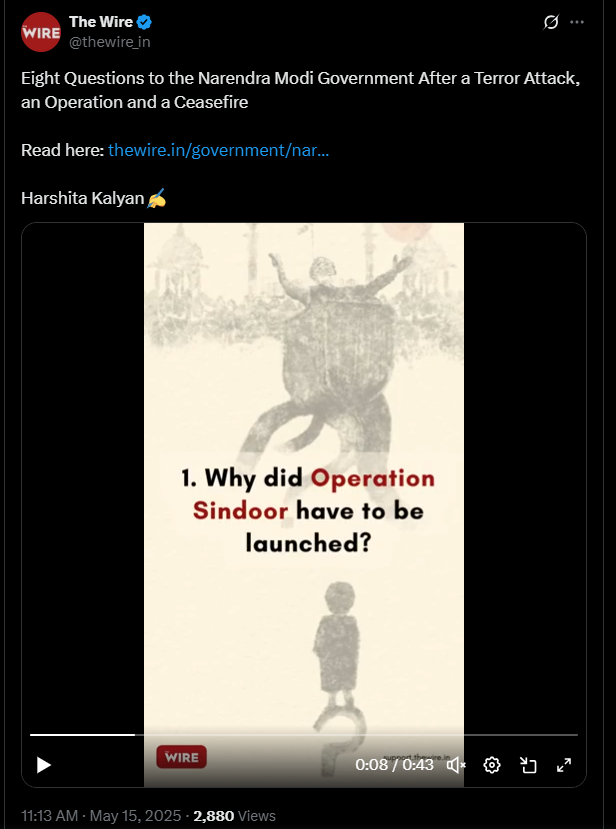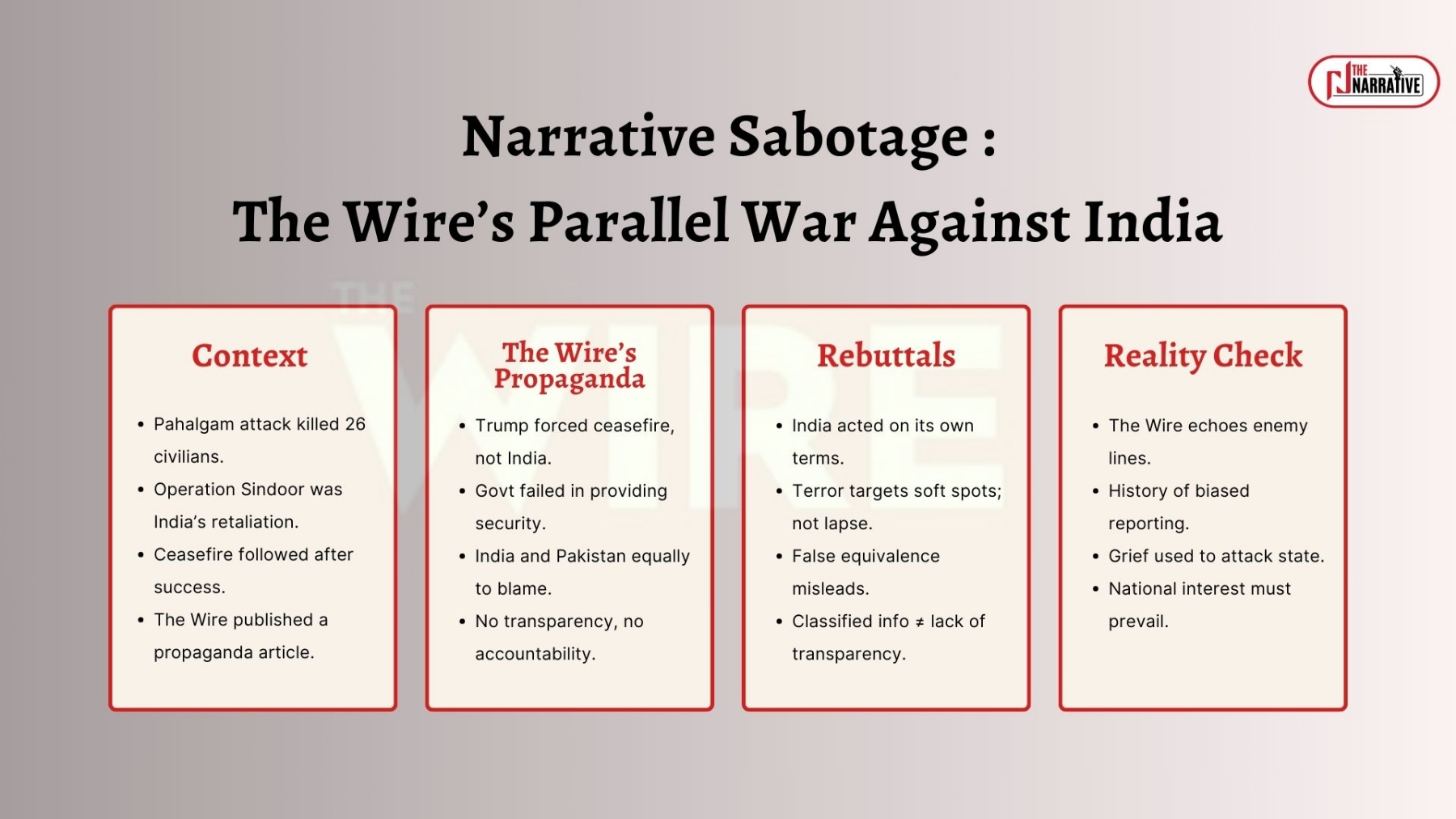Narrative Sabotage : The Wire’s Parallel War Against India
-(1)_202505151633117742_H@@IGHT_720_W@@IDTH_1280.jpg)
In the aftermath of Operation Sindoor, launched as a decisive retaliatory strike after the Pahalgam massacre, the Indian state has come under a different kind of attack — this time from within, and this time via pixels, not projectiles.
The latest example is a provocative editorial from the controversial website The Wire — an outlet repeatedly flagged for its ideological bias and suspended during Operation Sindoor for publishing content considered detrimental to national interest.

While the article cloaked itself in the language of empathy and democracy, its core intent was unmistakable: to blur the line between India and Pakistan, discredit Indian military action, and manipulate grief for political messaging.
The Operation and the Outrage
Let us first remember what led to Operation Sindoor: a cold-blooded terror attack in Baisaran Valley on April 22 that claimed 26 innocent lives, executed with chilling precision by gunmen asking victims to prove their religion before shooting. Among those who perished were children, newlywed tourists, and brave ponywallahs — one of whom, a Muslim Kashmiri, died trying to protect visitors.
The Indian military’s swift and calibrated retaliation was a response not only to grief, but to duty. The objective was clear: dismantle the cross-border terror infrastructure and send a signal that no act of terrorism would go unpunished. By May 12, multiple terror launchpads were reduced to rubble, infiltration corridors neutralized, and key commanders eliminated. This was not vengeance. It was deterrence.
Deconstructing The Wire’s Manufactured Dissent
Now enters The Wire, with a piece that begins by quoting Donald Trump as if the former U.S. President is a reliable barometer of international truth. Trump claimed he “forced” India and Pakistan into a ceasefire — a classic boast from a leader known for diplomatic hyperbole. And yet, The Wire builds its entire argument around this, ignoring India's official narrative and sovereignty. This deliberate elevation of Trump’s theatrics over India’s stated policy is not journalism. It’s narrative warfare.

The article’s central thrust is that India surrendered to U.S. pressure, and therefore failed. What it ignores is the strategic utility of flexible timelines in military diplomacy — where you strike first, establish dominance, and then control the disengagement optics. India accomplished this. Pakistan’s desperate calls for backchannel mediation via DGMO meetings and diplomatic emissaries is the real proof of that success.
Emotional Exploitation in the Name of Accountability
The Wire goes on to detail the agony of victims’ families — their pain is real, their sorrow undeniable. But it weaponizes this grief to suggest the state itself was complicit through security lapses. In effect, it tries to shift the blame from Pakistan-backed terrorists to Indian governance, a classic deflection tactic used by apologist journalism.
If one were to follow this logic, no country should retaliate unless every security checkpoint is manned, every forest patrolled, every valley sanitized. Terrorism thrives on exploiting soft targets. The issue isn’t the presence or absence of guards, but the existence of a neighboring state that harbors and exports terror.
False Parity: The Old Toolkit
Perhaps the most dangerous element of The Wire’s article is its relentless push for false equivalence. By questioning why India didn’t evacuate civilians before its strikes, it subtly implies moral culpability. But any military analyst will explain that a pre-evacuation of border villages would risk alerting Pakistan — compromising the element of surprise.
_202505151635587912_H@@IGHT_720_W@@IDTH_1280.jpg)
Moreover, civilian deaths in Pakistan’s retaliatory shelling — tragic as they are — underscore Islamabad’s unprovoked aggression, not India’s defensive posture. To draw equivalence between the initiator of terror and the responder to it is to insult both logic and justice.
Foreign Policy, Not Foreign Interference
The Wire questions why the ceasefire was announced by a third party. But the fact that Trump made a public statement does not mean he brokered a treaty. India has consistently denied third-party interference in Kashmir, and nothing in Operation Sindoor’s conduct indicates otherwise. This is selective framing designed to incite suspicion about India’s foreign policy choices.
The Selective Transparency Trap
Next comes the accusation that India is hiding operational losses, including potential aircraft downings. But real national security demands discretion. Responsible democracies do not broadcast tactical weaknesses during live operations. The Indian Air Force gave signal of “some losses” — but has rightly deferred disclosure for strategic timing. Transparency does not mean tactical naiveté.
The Wire’s Agenda is No Secret
This article is just one more in a long chain of anti-state rhetoric emanating from The Wire — a platform previously exposed for falsifying documents in the infamous Tek Fog case, amplifying Naxal-friendly narratives, and receiving questionable foreign funds under FCRA scrutiny.

During a national security operation, its editorial choices showed more alignment with Pakistani dailies than with Indian national interest. That it was suspended during Operation Sindoor is not a sign of repression; it's a measure against information sabotage during wartime.
The Real Question: Whose Side Are You On?
India is at war with terror — not communities, not Kashmiris, not dissent. And yet, in such a critical hour, The Wire would rather turn its guns inward. It invokes Pahalgam’s victims only to use their tragedy as a rhetorical club against the state. It uses American drama to belittle Indian diplomacy. It paints surgical strikes as PR stunts, forgetting the soldiers who never returned.
Where The Wire sees a "loss of moral leadership," the nation sees resolve, restraint, and resurgence. Operation Sindoor was a statement: that India does not wait for international sympathy to defend its citizens. And that, perhaps, is what unsettles the propagandists the most.
A Nation Must Not Be Gaslit
National discourse must make space for dissent, yes — but not for deliberate distortion. The Wire’s piece isn’t just anti-establishment; it is anti-clarity, anti-sovereignty, and anti-truth.
While India's armed forces neutralize threats across the border, it's time we recognize and challenge those who, under the guise of journalism, erode the nation’s confidence from within.